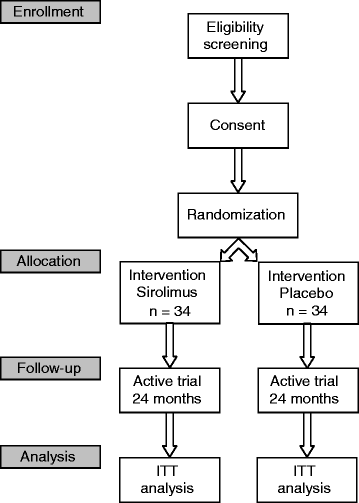Pulsed oral sirolimus in advanced autosomal-dominant polycystic kidney disease (Vienna RAP Study): study protocol for a randomized controlled trial
- PMID: 25899445
- PMCID: PMC4423136
- DOI: 10.1186/s13063-015-0692-3
Pulsed oral sirolimus in advanced autosomal-dominant polycystic kidney disease (Vienna RAP Study): study protocol for a randomized controlled trial
Abstract
Background: Autosomal-dominant polycystic kidney disease (ADPKD) is a hereditary illness that causes renal tubular epithelial cells to form cysts that proliferate and destroy renal tissue. This usually leads to a decline in renal function, and often to terminal kidney failure, with need for renal replacement therapy. There is currently no causative therapy. The mammalian target of rapamycin (mTOR) inhibitor sirolimus (SIR) is an immunosuppressant with strong antiproliferative effects, and is potentially able to stop or reduce cyst growth and preserve renal function in ADPKD. Continuous mTOR exposure results in a loss of its antiproliferative effects on renal tubular cells. With a half-life of roughly 60 hours, pulsed (weekly) administration of SIR may be an effective way to reduce cyst growth and preserve excretory renal function in ADPKD.
Methods/design: The Vienna RAP Study is a randomized, double-blind, placebo-controlled trial, funded by the Anniversary Fund of the Oesterreichische Nationalbank. We will investigate the effects of a weekly dose of 3 mg SIR on kidney function in 34 patients with advanced ADPKD, compared to a placebo equivalent in 34 patients with advanced ADPKD, over 24 months. The primary endpoint is creatinine level (less or equal than 1.5-fold increase in serum creatinine without initiation of dialysis over two years) and dialysis, renal transplantation, or death. The secondary endpoints are safety, change in proteinuria (as indicated by albumin/creatinine- and protein/creatinine ratio, respectively), and creatinine clearance.
Discussions: The Vienna RAP Study is, to the best of our knowledge, the first study to investigate the effects of a pulsed (weekly) dose of SIR on renal function in ADPKD.
Trial registration: This trial was registered with EudraCT (identifier: 2012-000550-60 (EU)) on 27 November 2013 and with ClinicalTrials.gov (identifier: NCT02055079 (USA)) on 3 February 2014.
Figures
References
Publication types
MeSH terms
Substances
Associated data
LinkOut - more resources
Full Text Sources
Other Literature Sources
Medical
Miscellaneous


